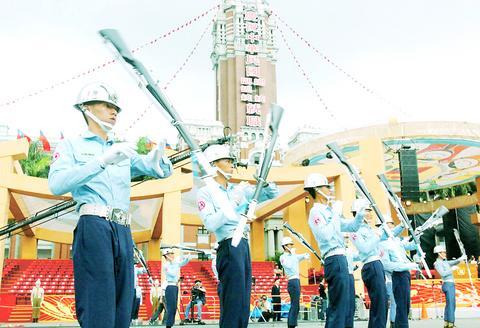Deputy Chief of the General Staff Admiral Fei Hung-po (費鴻波) yesterday, on the eve of President Chen Shui-bian's (陳水扁) inauguration, confirmed that the USS Kitty Hawk aircraft carrier is patrolling the western Pacific Ocean between Japan and the Philippines, but added that the patrol was part of annual US Navy exercises.
"I cannot say that the US Navy does this [patrolling areas near Taiwan's territorial waters] for no reason," Fei said.

PHOTO: CHIANG YING-YING, TAIPEI TIMES
"However, I cannot comment on this on behalf of the US Navy," he said.
Fei made the remarks when answering a request by Democratic Progressive Party (DPP) Legislator Tang Huo-sheng (
Fei urged the public to stay calm in the light of the carrier's presence and the US Air Force deploying B-52 bombers in Guam.
"Whatever they [US Navy and Air Force] did, they were merely trying to help retain peace across the Taiwan Strait. We do not have to panic," the admiral said.
Lawmakers yesterday also voiced their concern in the legislature about stability in the Taiwan Strait during Chen's inauguration, in the wake of China's threatening statement on Sunday that accused Chen of paving the way for Taiwan independence and vowing to crush any such attempt.
People First Party (PFP) Legislator Chao Liang-yen (趙良燕) asked Fei whether the Kitty Hawk's activities in the area could be linked to the presidential inauguration. Fei said that the two events were in no way related.
"According to our communications with the US Navy, the Kitty Hawk annually visits Hong Kong during the first six months of the year and Singapore or Australia during the remaining six months of the same year.
"We shall not comment on this," Fei said.
He confirmed that the aircraft carrier's activities and the deployment of the B-52 bombers in Guam will definitely help and encourage Taiwan to maintain peace in the area.
Fei also said that high-ranking military officials "cannot guarantee that China will not challenge Taiwan with unusual military activities during the inauguration on May 20 [today]," but added that he had no information suggesting that this would happen.
"Our regular military exercises remain unchanged and everything is on the right track. We do not have to panic," Fei said.

The Ministry of Foreign Affairs (MOFA) yesterday said it is closely monitoring developments in Venezuela, and would continue to cooperate with democratic allies and work together for regional and global security, stability, and prosperity. The remarks came after the US on Saturday launched a series of airstrikes in Venezuela and kidnapped Venezuelan President Nicolas Maduro, who was later flown to New York along with his wife. The pair face US charges related to drug trafficking and alleged cooperation with gangs designated as terrorist organizations. Maduro has denied the allegations. The ministry said that it is closely monitoring the political and economic situation

Conflict with Taiwan could leave China with “massive economic disruption, catastrophic military losses, significant social unrest, and devastating sanctions,” a US think tank said in a report released on Monday. The German Marshall Fund released a report titled If China Attacks Taiwan: The Consequences for China of “Minor Conflict” and “Major War” Scenarios. The report details the “massive” economic, military, social and international costs to China in the event of a minor conflict or major war with Taiwan, estimating that the Chinese People’s Liberation Army (PLA) could sustain losses of more than half of its active-duty ground forces, including 100,000 troops. Understanding Chinese

UNRELENTING: China attempted cyberattacks on Taiwan’s critical infrastructure 2.63 million times per day last year, up from 1.23 million in 2023, the NSB said China’s cyberarmy has long engaged in cyberattacks against Taiwan’s critical infrastructure, employing diverse and evolving tactics, the National Security Bureau (NSB) said yesterday, adding that cyberattacks on critical energy infrastructure last year increased 10-fold compared with the previous year. The NSB yesterday released a report titled Analysis on China’s Cyber Threats to Taiwan’s Critical Infrastructure in 2025, outlining the number of cyberattacks, major tactics and hacker groups. Taiwan’s national intelligence community identified a large number of cybersecurity incidents last year, the bureau said in a statement. China’s cyberarmy last year launched an average of 2.63 million intrusion attempts per day targeting Taiwan’s critical

‘SLICING METHOD’: In the event of a blockade, the China Coast Guard would intercept Taiwanese ships while its navy would seek to deter foreign intervention China’s military drills around Taiwan this week signaled potential strategies to cut the nation off from energy supplies and foreign military assistance, a US think tank report said. The Chinese People’s Liberation Army (PLA) conducted what it called “Justice Mission 2025” exercises from Monday to Tuesday in five maritime zones and airspace around Taiwan, calling them a warning to “Taiwanese independence” forces. In a report released on Wednesday, the Institute for the Study of War said the exercises effectively simulated blocking shipping routes to major port cities, including Kaohsiung, Keelung and Hualien. Taiwan would be highly vulnerable under such a blockade, because it